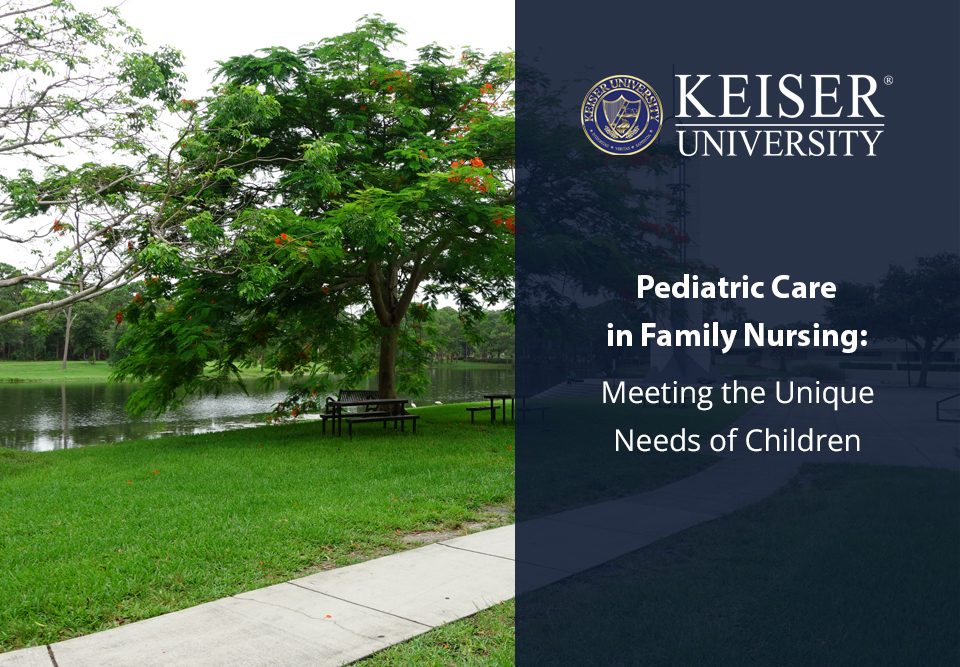Across all specialty areas and at all levels of the healthcare system, medical experts are realizing that patient-centered, evidence-based pediatric care improves outcomes for patients throughout their entire lifetime. Pediatric care is about more than checking up on children’s growth and development or providing them with medication when they feel ill. In today’s modern healthcare system, family centered care in pediatric nursing plays a crucial role, requiring physicians and nurses to provide children, as well as their families with comprehensive support during these critical, foundational years.
What Is Pediatric Care in Family Nursing?
Pediatrics is a medical specialty that focuses on the care of children, typically from birth until 18 years of age. According to research published in the Maternal and Child Health Journal, family centered care in pediatric nursing is defined as a collaborative approach to healthcare in which providers view family members and caregivers as partners in the decision-making process. Family nurse practitioners often work to provide families and caregivers with comprehensive information as well as personalized healthcare services to promote the physical, social and emotional growth of the child.
Importance of Specialized Care for Children
Childhood is a stage of life defined by rapid growth and development, and providing children with specialized care ensures that each child hits appropriate benchmarks. Specialized care adheres to the principles of family-centered care in pediatric nursing, emphasizing collaboration with families to create a holistic approach. Due to the personal and rewarding nature of this medical specialty, it is not uncommon for nurses to feel called to work with pediatric patients.
“My experience is that nurses or people who want to go into nursing who have an interest in pediatrics, they have that interest going in,” said Dr. Brian Keintz. “They have an enthusiasm about pediatrics, about working with kids.”
Pediatric Care vs. Adult Care
Pediatric care is unique in the sense that nurses and healthcare providers care for patients not able to absorb the information or advocate for themselves. As a result, this medical specialty is often seen as a partnership — one that exists between the provider, the patient, and their caregivers/family.
“The difference is when you’re taking care of pediatrics, you have more than one patient,” said Dr. Mary Jane Mindlin. “You have both the family and the individual person themselves. And as a healthcare provider, you want to address the needs of both.”
Introduction to Pediatric Care
Pediatric care is defined by the Cleveland Clinic as a medical specialty that focuses on treating patients from the time of birth until the age of 18 years old. In addition to diagnosing illness and developing comprehensive treatment plans, pediatric care providers also emphasize the importance of preventative care.
Developmental Stages and Care
From birth until 5 years old, children experience rapid growth and development, and the experiences that they have during this time will shape the rest of their lives. Developmental stages can be broken down into four distinct categories:
- Cognitive development
- Motor skill development
- Social and emotional development
- Adaptive development
Pediatric Care Best Practices
The treatment that a child receives will vary significantly based on their individual growth and development as well as their environment. However, in line with the Center for Health Care Strategies and research published in the Hospital Pediatrics journal, these are some of the pediatric care best practices for providers to keep in mind:
- Acknowledge the concerns of the family members and always do a comprehensive evaluation of the patient.
- Take note of subtle signs and symptoms that a caregiver may not recognize.
- Prioritize communication and relay information in a way that is clear and understandable.
- Conduct assessments to evaluate and improve the care provided.
Common Pediatric Health Issues
As their immune systems develop and they are exposed to new environments, young children have a tendency to get sick more frequently. These are some common pediatric health issues that healthcare providers may face:
Flu and Respiratory Issues
Due to the fact that flu and other respiratory viruses can easily spread, it is not surprising that this is one of the most common health concerns in pediatric patients.
“The most common one that we see over and over again is respiratory,” said Dr. Mary Jane Mindlin. “Respiratory is the number one diagnosis where a child comes in with a runny nose or a cough or sneezing or something along those lines.”
Viral and Bacterial Infections
Viral and bacterial infections are incredibly common in young children, but providers must recognize the difference between the two to create the right treatment plan. While bacterial infections can often be treated with antibiotics, viral infections require a different approach.
“The best treatment for viral infections is rest and drinking lots of water, staying hydrated and … getting some fruits and vegetables in their systems,” Dr. Mary Jane Mindlin said.
Vaccines and Injections
Vaccines and immunizations are some of the most effective ways to reduce disease and disability as well as prevent death. Pediatric care providers often work with their patients to advocate for routine vaccinations and to explain the health benefits associated with these injections.
Pediatric Health Promotion and Education
Providers who work exclusively with pediatric patients are responsible for treating their patients and providing caregivers with vital information about pediatric health and development.
Types of Pediatric Care
These are the primary types of pediatric care:
Short-Term Care
Short-term care is temporary pediatric care provided for children who have been diagnosed with a minor illness or who have experienced a minor injury.
Long-Term Care
Long-term care is extended pediatric care that is provided for children who have been diagnosed with a complex medical condition or a serious traumatic injury. The number of children who require long-term care is on the rise.
Chronic Care
Chronic care is a specialized form of long-term care that focuses on the management of chronic illnesses. Children who have been diagnosed with diabetes, congenital heart disease and other lifelong illnesses receive chronic pediatric care.
Pediatric Nursing Skills
Nurses who want to work with pediatric patient populations will need to develop specialized skills. These are the top pediatric nursing skills:
Attention to Detail and Observation Skills
Pediatric nurses have to be particularly attentive because their patients may not be able to explain or communicate their symptoms. They must be able to recognize subtle signs and symptoms of illness in their patients.
“I think to be a good provider for pediatric care, you also have to be extremely and highly observant because the signs of discomfort or pain are very different in pediatrics,” Dr. Mary Jane Mindlin said.
Innate Curiosity and Desire to Learn
The world of pediatrics is never dull, with children surprising their providers each and every day. Pediatric nurses must have an endless sense of curiosity and wonder that motivates them to continue learning about their patients.
“They have to have curiosity,” said Dr. Brian Keintz about family nurse practitioners. “Good providers approach care with curiosity and a desire to solve the problem. Where’s your innate curiosity about the problem? Solve the problem.”
This sense of curiosity can lead to improved patient outcomes as well. Dr. Mary Jane Mindlin said that pediatric nurses must have “curiosity about people, curiosity about the world, curiosity about how things can be improved on a regular basis.”
Pediatric Assessment Techniques
Pediatric nurses must also be familiar with the most effective pediatric assessment techniques. In some cases, nurses may have to employ creative and fun-loving techniques to thoroughly and completely assess their young patients.
Communication Skills
Communication is essential in all healthcare specialties, particularly pediatrics. “It does take a special skill set to be able to communicate effectively with children,” said Dr. Mary Jane Mindlin.
“It’s a different way of communicating than when you communicate with adults. … You ask questions a bit differently. In children, you use very basic, straightforward and clear language.”
Willingness to Make Mistakes
The stakes are high when working with young patients who cannot advocate for themselves, but when learning in the classroom or simulated educational environments, pediatric nurses must be able to give themselves grace. “I think there has to be a willingness to discover new ways of doing things and this may involve making mistakes,” said Dr. Brian Keintz. “Education programs are a safe environment for making those mistakes.”
Family-Centered Approach to Pediatric Care
Described as a partnership approach, family-centered care is pivotal to the success of pediatric care. Due to the vulnerable nature of pediatric patients, it is important for providers to work closely with family members and caregivers to provide education, support and healthcare treatment services.
Family Culture and Background
Pediatric providers, including physicians and nurses, need to be aware of the family culture and background before they begin providing care to patients. Developing a deep sense of cultural awareness can help providers offer personalized, effective and respectful care and can allow them to break down the barriers that may exist between providers and patients.
Educating Families on Child Health Needs
Education is a cornerstone of family centered care in pediatric nursing. By prioritizing education, pediatric nurse practitioners can empower their patients’ caregivers and allow them to become better advocates for their children. Effective education programs can significantly improve patient outcomes and patient satisfaction ratings.
Building Trust and Communication
Ultimately, there needs to be a deep sense of trust between pediatric care providers, family members and children. “The children, themselves, and their families, are your best source of information. Children want to be respected,” said Dr. Mary Jane Mindlin.
“You have to have the trust of the child to be able to examine them and figure out what’s going on, but you also have to have the trust of the parents, and then you have to engage the two together as a team in order to be able to make a correct diagnosis and then come up with the most appropriate plan of care.”
Discover the Role of Family Nursing in Today’s Modern Healthcare System at Keiser University Graduate School
Growing families are in search of personalized pediatric services that cater to the unique needs of their children. At Keiser University Graduate School, we offer a Master of Science in Nursing, Family Nurse Practitioner degree program that focuses specifically on pediatric patient populations. Our program aligns with the principles of family-centered care in pediatric nursing, allowing nurses to develop the advanced and precise clinical skills required to provide comprehensive healthcare services to children from birth until the age of 18.
Contact a graduate admissions counselor today to learn more about our graduate degree programs.






 The instructors at Keiser University impacted my life. They believed in my ability to become a great graphic designer, regardless of how I felt about my skills. KU helped to prepare me for the real world and got me to where I am today.
The instructors at Keiser University impacted my life. They believed in my ability to become a great graphic designer, regardless of how I felt about my skills. KU helped to prepare me for the real world and got me to where I am today.
